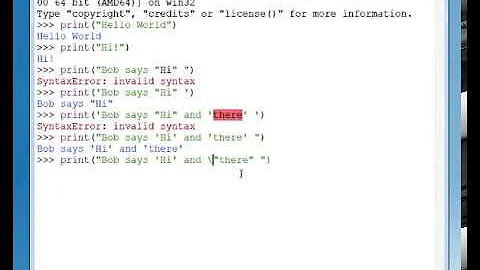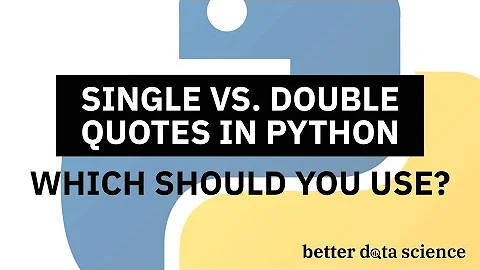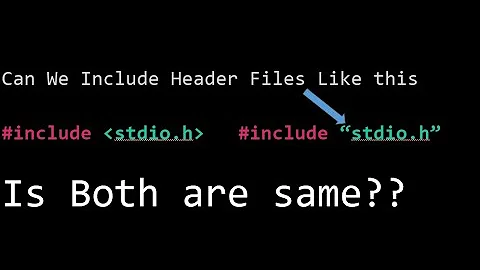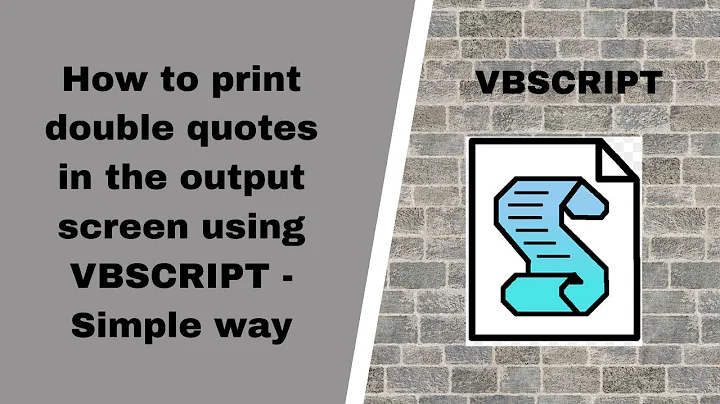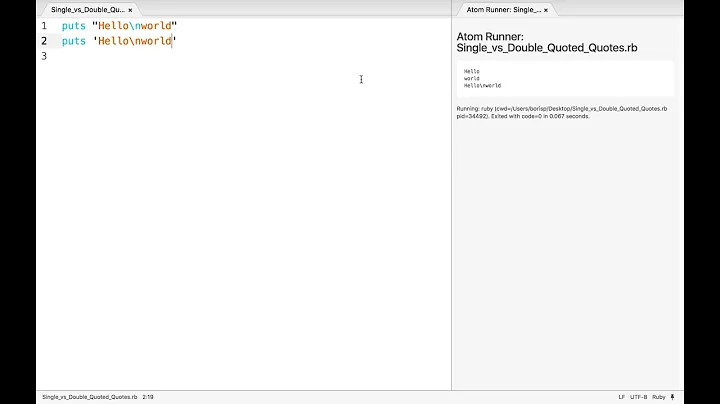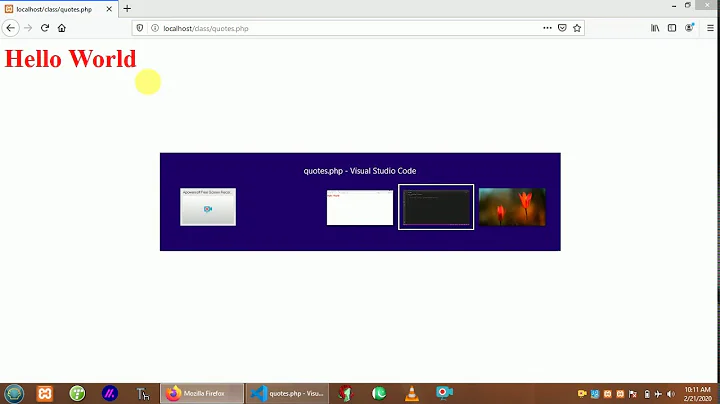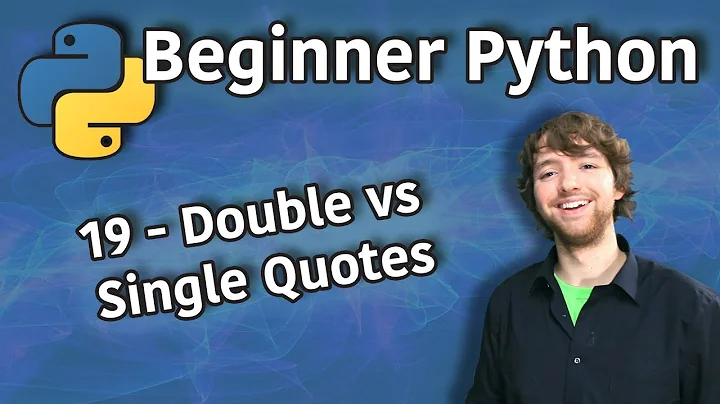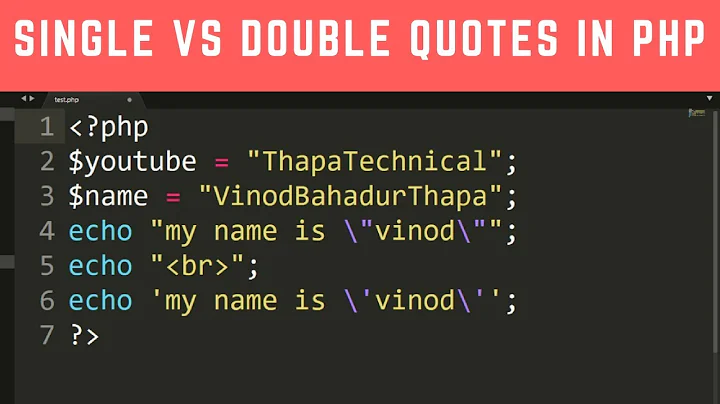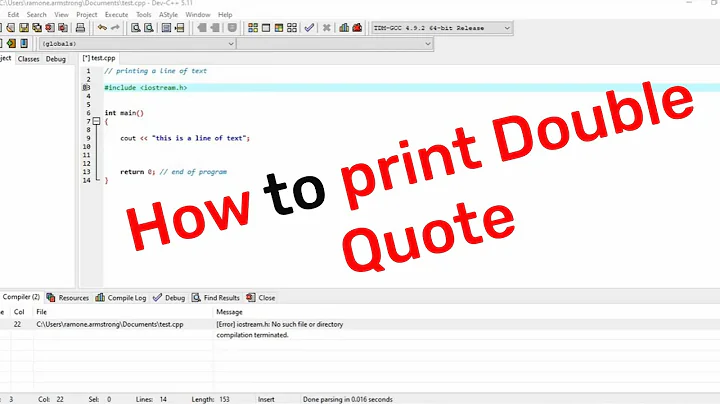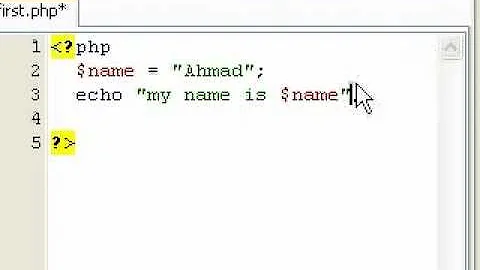Single quotes vs. double quotes in C or C++
Solution 1
In C and in C++ single quotes identify a single character, while double quotes create a string literal. 'a' is a single a character literal, while "a" is a string literal containing an 'a' and a null terminator (that is a 2 char array).
In C++ the type of a character literal is char, but note that in C, the type of a character literal is int, that is sizeof 'a' is 4 in an architecture where ints are 32bit (and CHAR_BIT is 8), while sizeof(char) is 1 everywhere.
Solution 2
Some compilers also implement an extension, that allows multi-character constants. The C99 standard says:
6.4.4.4p10: "The value of an integer character constant containing more than one character (e.g., 'ab'), or containing a character or escape sequence that does not map to a single-byte execution character, is implementation-defined."
This could look like this, for instance:
const uint32_t png_ihdr = 'IHDR';
The resulting constant (in GCC, which implements this) has the value you get by taking each character and shifting it up, so that 'I' ends up in the most significant bits of the 32-bit value. Obviously, you shouldn't rely on this if you are writing platform independent code.
Solution 3
Single quotes are characters (char), double quotes are null-terminated strings (char *).
char c = 'x';
char *s = "Hello World";
Solution 4
'x'is an integer, representing the numerical value of the letter x in the machine’s character set"x"is an array of characters, two characters long, consisting of‘x’followed by‘\0’
Solution 5
I was poking around stuff like: int cc = 'cc'; It happens that it's basically a byte-wise copy to an integer. Hence the way to look at it is that 'cc' which is basically 2 c's are copied to lower 2 bytes of the integer cc. If you are looking for a trivia, then
printf("%d %d", 'c', 'cc'); would give:
99 25443
that's because 25443 = 99 + 256*99
So 'cc' is a multi-character constant and not a string.
Cheers
Related videos on Youtube
Vishwanath Dalvi
SOreadytohelp about me box is kept "", intentionally.
Updated on October 08, 2021Comments
-
Vishwanath Dalvi over 2 years
When should I use single quotes and double quotes in C or C++ programming?
-
Vishwanath Dalvi over 13 yearsthanks . means character is 1 byte with no null character '/0'at the end .. string contains null character at the end .
-
Oliver Charlesworth over 13 years@mr_eclair: A string literal always contains an implicit null terminator, but be careful. You could write something like
char str[] = {'H','e','l','l','o'};, andstrwould not have a null terminator. -
Steve Jessop over 13 yearsin that situation,
strisn't a string (at least, not a C-style string, which is defined to be a NTBS). -
Oliver Charlesworth over 13 years@Steve: Understood. My point to @mr_eclair was that not everything that's a
char[](which people often thing of as "strings") is null-terminated. -
eeeeaaii over 11 yearsThanks, I just saw this in some code and my response can only be described as "WTF". I have been using GCC on and off for 15 years and have never once run into this until now.
-
Wolf almost 10 years+1 besides magic headers, often used for command line evaluation.
-
Wolf almost 10 years@OliCharlesworth this is - fortunately - not the full truth: these are two string literals separated by a comment:
"hello" /*seamlessly connected to*/ "world". And this can make sense for commented multi-line messages. -
 Mike Precup almost 10 yearsThis doesn't really add any value to the question, since this information has already been encompassed in the other answers.
Mike Precup almost 10 yearsThis doesn't really add any value to the question, since this information has already been encompassed in the other answers. -
OldSchool about 9 years"hello world" is a
const char *. -
CodeGuru over 8 years@Eiko when do you put a * infront of a variable eg *s as above?
-
Eiko over 8 years@CodeGuru You use a * when the variable is a pointer type. In this case, 's' points to an array of characters.
-
uzay95 over 3 yearsI didn't get this:
25443 = 99 + 256*99Why 256*99? -
Jack Murrow over 3 years@OldSchool In C++, yes, but in C, no. In C, it's a
char *, not aconst char *.
